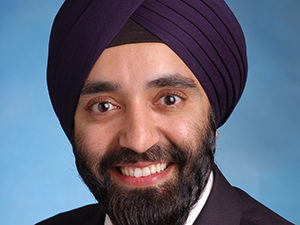Sex transcends just recreation and procreation — it’s a key part to being human. But what are the best ways for men to maximize their sexual health across their lifetime?
Amanjot Sethi, MD, a urologist at the Kaiser Permanente Walnut Creek Medical Center, talks to men every day about a wide range of sexual health concerns, ranging from prostate cancer to erectile dysfunction to sexually transmitted infections (STIs). Look insideKP Northern California sat down with Dr. Sethi to learn more about these important issues facing men throughout their lifetime.

Describe what men — ages teens through 30s — should be thinking about when it comes to their sexual health.
This is a particularly important stage in a man’s life — it’s usually when they decide to engage in sexual activity for the first time and should be thinking about how to do so safely. I would encourage parents to have honest conversations about safe sex practices before they think that their kids may be having sex. I once had a father and son come to see me when the son was considering becoming sexually active, and we had an open, honest conversation about consent, contraception, and how to protect against STIs. Hopefully, parents will consider having these types of conversations more often.
Cases of HPV are on the rise — there are 7 million men in the United States who carry the strains that can cause cancers of the cervix, throat, tongue, and other areas of body. The American Academy of Pediatrics and the CDC recommend that kids should get the HPV vaccine before their 13th birthday.
Unfortunately, testicular cancer is most commonly diagnosed in this age group. The good news is that it’s very treatable when caught early. I recommend that men of this age group perform proper self-exams and seek medical attention if they find something abnormal.
And what about men ages 40s through 60s?
Many men in this age group ask me about erectile dysfunction. Historically, many men have felt ashamed to talk about this topic with their physician. However, in more recent years this conversation has been facilitated by the advent of effective oral medications and the related widespread media. Erectile dysfunction can occur as a result of many factors. We first try to address modifying certain lifestyle habits, such as quitting smoking, reducing stress, losing weight, and getting regular exercise, before moving into other options.
If changing behaviors doesn’t work, a patient can consider taking oral medications, doing self-injections, or using vacuum erection devices. Finally, we can also talk about using mechanical devices, such as an inflatable penile implant.
Men in this age range should also be thinking about screening for prostate cancer, which is the most common cancer for men. About 1 man in 7 will be diagnosed with prostate cancer during his lifetime. If there aren’t any family or genetic risk factors, men should begin prostate cancer screening at age 50.
How about geriatric patients?
One thing my geriatric patients have taught me is that you are never too old to have sex! The same questions and protocols for a happy, healthy sexual life still apply — practicing safe and consensual sex and getting relevant cancer and STI screenings.
Anything else to add about men’s sexual health?
I encourage men to be engaged in their own health. I see too many men who ignore physical signs and symptoms of disease or a medical condition, which can lead to longer treatments and poorer outcomes. Ask your doctor questions. Think about your family history. It’s this sort of proactive behavior that will best serve men and their families in the long run.





This Post Has 3 Comments
Great post! Thanks for sharing the knowledge and keep up the good work.
Thank you for encouraging parents to have conversations early and often with their children about sex and sexuality and for being open to having these important conversations with the men in your practice and helping them to have a happy and healthy sex life.
Remi Newman, MA
Clinical Health Educator for the HIV/STD team at Kaiser Santa Rosa
Dear Dr Amanjot Sethi,
Great article! Men’s sexual health is important and a challenging journey for men of all ages. I am a sex therapist at Campbell Kaiser Adult Psychiatry.
Best,
Stephen